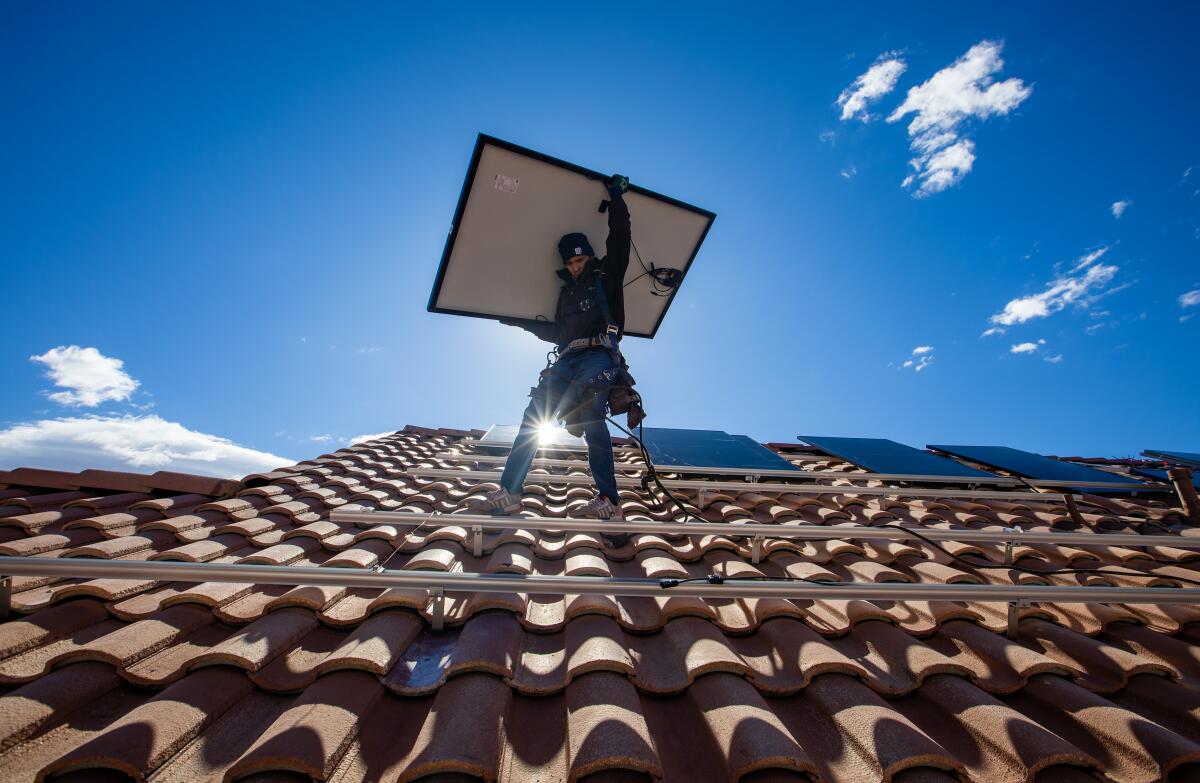Letters to the Editor: Is your roof the best place for local solar? Probably not

To the editor: The photograph with Sammy Roth’s column, “How I learned to stop worrying and love rooftop solar,” showing a worker installing solar panels on top of a clay tile roof, should make readers question why there.
The author lays out the conflict between residential rooftop solar and the destruction of desert landscapes with huge solar farms. But there are better options for combating climate change.
Studies show that cities with fewer trees and shade are becoming heat islands, and having acres of asphalt parking lots everywhere just makes things worse. Some schools and businesses have started to integrate solar panels with parking lot shade structures that both produce energy and reduce heat absorption. Commercial buildings have huge roofs where solar panels can easily be installed.
Solar installation companies have used subsidies to generate profits by enticing residential consumers to risk the integrity of their own roofs in exchange for temporary energy cost savings. There are more efficient ways to use solar panels and better locations to put them than on top of houses.
Les Hall, Santa Ana
..
To the editor: Right now, rooftop solar is in a precarious state.
The recent decisions by the California Public Utilities Commission have not only dealt severe blows to renewable energy but also put the state’s climate goals in jeopardy. It is evident that the CPUC prioritizes the interests of private utilities and investors over those of Californians, especially disadvantaged communities, schools and farmers. The virtual net metering decision is a stark example of this bias.
These decisions by the CPUC have caused a drastic decline in solar sales and an exodus of jobs. Gov. Gavin Newsom must take decisive action and step in to champion climate action, environmental justice and equity.
It’s time to recalibrate the CPUC’s focus toward a sustainable future that benefits all Californians. Let us not compromise our climate goals, jeopardize the well-being of Californians and witness the further deterioration of our state’s once-promising rooftop solar landscape.
Andrea León-Grossmann, Los Angeles
The writer is deputy program director in the West for Vote Solar.
..
To the editor: In his rather lukewarm endorsement of rooftop solar power, Roth states that putting panels over parking lots, canals and warehouses won’t be sufficient to avoid the need for giant solar farms.
According to an op-ed piece by Pitzer College professor Susan A. Phillips in the same issue, the Inland Empire has 1.6 billion square feet of warehouse space. That would support an awful lot of rooftop solar panels — enough, I’d imagine, to completely power the warehouses with clean energy, including charging stations for a fleet of electric delivery trucks — and reduce the need for habitat-destroying solar farms.
Any excess energy produced could be given for free to the surrounding residents, thus offsetting some of the environmental harms cited by Phillips. A win-win for everyone — including desert tortoises.
Kathy Barreto, Culver City
..
To the editor: The problem of global warming requires more than the action taken thus far. Immediate reduction in greenhouse gas emissions demands projects that can be built quickly and provide the biggest bang for our buck.
I agree that in the short term, the construction of large-scale solar and wind farms should take precedence over residential solar systems with battery storage. However, to incentivize property owners to convert to clean energy, federal and state residential and commercial building tax credits need to be increased.
Furthermore, lower-income residents who cannot afford the cost of residential solar should not have to pay higher power bills to offset lower utility revenues.
In the long term, our national goal should include advanced, safer nuclear reactors similar to the prototype under construction in Wyoming, funded by Bill Gates.
Larry Naritomi, Monterey Park
..
To the editor: Kudos to Sammy Roth for his comprehensive, erudite and balanced article on rooftop solar. He made the complexities of this issue very clear and subsequently drew his conclusions, with which I heartily agree.
I look forward to more articles on the environment from this very fine thinker.
Tamra Nelson, Los Angeles






